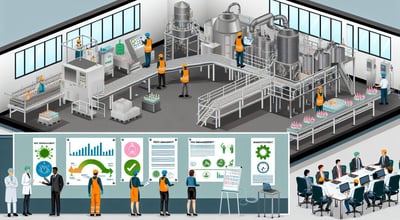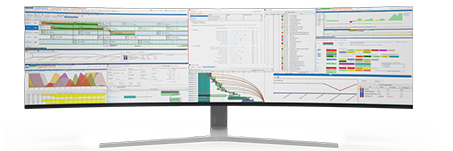Scheduling Project Implementation in Supply Chain Management
Ensuring seamless operations is imperative in Food and Beverage manufacturing. As a Supply Chain Manager, you understand the intricate dance between demand forecasting, production planning, and distribution logistics. However, amidst the complexity, there lies a constant companion: risk.
In this blog, we look into the critical realm of scheduling project implementations and how adeptly managing them can mitigate risks, ensuring smoother operations and greater efficiency. We'll explore the integration between advanced scheduling tools like PlanetTogether and leading ERP, SCM, and MES systems such as SAP, Oracle, Microsoft, Kinaxis, and Aveva, shedding light on their pivotal role in risk management.

Understanding Risk in Scheduling Project Implementations
Before looking into risk management strategies, it's vital to grasp the inherent risks in scheduling project implementations. Whether you're upgrading your existing systems or implementing new software, several factors contribute to potential disruptions:
Technical Challenges: Introducing new software or integrating existing systems can lead to technical hurdles, ranging from compatibility issues to data migration complexities.
Resource Allocation: Allocating resources, including time, manpower, and finances, poses a significant challenge. Mismanagement in this aspect can lead to delays and cost overruns.
Change Management: Resistance to change among employees can impede project progress. Overcoming inertia and ensuring smooth transition becomes paramount.
Supply Chain Disruptions: External factors such as supplier issues, market fluctuations, or geopolitical events can significantly impact project timelines and outcomes.
Data Security Concerns: With the digital landscape evolving rapidly, safeguarding sensitive data against cyber threats is crucial. Any breach can not only disrupt operations but also tarnish the company's reputation.
Now that we've identified the key risks, let's look into effective strategies for managing them during scheduling project implementations.

Risk Management Strategies
Comprehensive Planning
Thoroughly map out the project scope, objectives, and timelines, considering potential bottlenecks and resource constraints.
Engage stakeholders early on to gather insights and align expectations, fostering transparency and accountability.
Utilization of Advanced Scheduling Tools
Leverage advanced scheduling software like PlanetTogether to optimize production schedules, minimize lead times, and enhance resource utilization.
Integrate scheduling tools seamlessly with existing ERP, SCM, and MES systems to ensure real-time data synchronization and facilitate informed decision-making.
Robust Change Management Protocols
Implement structured change management protocols to address employee concerns, provide adequate training, and foster a culture of adaptability.
Communicate the benefits of the new systems effectively, emphasizing how they streamline operations and empower employees.
Collaborative Supplier Relationships
Cultivate collaborative relationships with key suppliers, fostering transparency and open communication channels to mitigate supply chain disruptions.
Diversify your supplier base and establish contingency plans to minimize the impact of unforeseen events.
Continuous Monitoring and Evaluation
Implement robust monitoring mechanisms to track project progress, identify potential deviations from the plan, and take timely corrective actions.
Conduct regular risk assessments to anticipate emerging threats and adapt strategies accordingly, ensuring agility and resilience in the face of uncertainty.


Integration with ERP, SCM, and MES Systems
The integration between advanced scheduling tools like PlanetTogether and leading ERP, SCM, and MES systems such as SAP, Oracle, Microsoft, Kinaxis, and Aveva plays a pivotal role in enhancing risk management capabilities. By seamlessly integrating these systems, organizations can achieve:
Real-time Data Synchronization: Integration ensures that data flows seamlessly between different systems, providing stakeholders with up-to-date insights into production schedules, inventory levels, and resource allocations.
Streamlined Processes: Automation and standardization of processes across various departments enable smoother collaboration and eliminate manual errors, enhancing efficiency and productivity.
Enhanced Decision-making: Access to accurate, real-time data empowers decision-makers to make informed choices, anticipate potential risks, and implement proactive measures to mitigate them effectively.
Optimized Resource Utilization: Integration enables organizations to optimize resource utilization across the supply chain, minimizing waste and maximizing profitability.
Improved Customer Satisfaction: By ensuring timely delivery of products and maintaining optimal inventory levels, integration contributes to enhanced customer satisfaction and loyalty.
In Food and Beverage manufacturing, effective risk management is indispensable for ensuring operational resilience and sustained growth. Scheduling project implementations, when executed meticulously and supported by advanced scheduling tools like PlanetTogether and seamless integration with ERP, SCM, and MES systems, emerge as a cornerstone of risk mitigation strategies.
As a Supply Chain Manager, embracing a proactive approach to risk management, leveraging cutting-edge technologies, and fostering collaboration across departments and stakeholders will empower you to navigate uncertainties with confidence, driving sustainable success in your organization's journey.
Remember, in the realm of supply chain management, risk may be inevitable, but with strategic planning and robust execution, it's certainly manageable.
Are you ready to take your manufacturing operations to the next level? Contact us today to learn more about how PlanetTogether can help you achieve your goals and drive success in your industry.























LEAVE A COMMENT